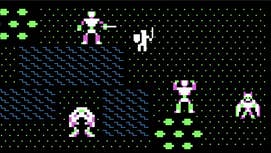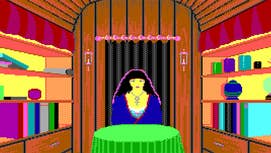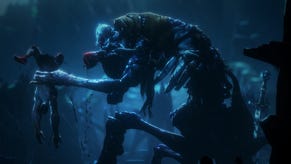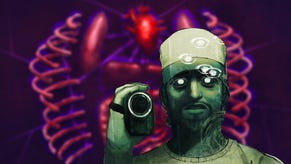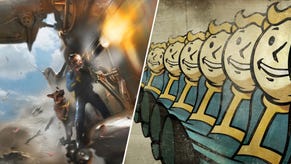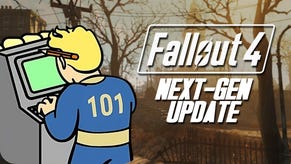How Richard Garriott Got Players to Start Thinking About the Choices They Make in Ultima IV
Today's in-game morality systems owe a huge debt to Ultima IV.
This article first appeared on USgamer, a partner publication of VG247. Some content, such as this article, has been migrated to VG247 for posterity after USgamer's closure - but it has not been edited or further vetted by the VG247 team.
The following excerpt comes from Break Out: How the Apple II Launched the PC Gaming Revolution by David L. Craddock, available in hardcover from Schiffer Publishing. The book chronicles the making of over a dozen groundbreaking PC games, featuring interviews with their developers and details how they went on to influence the games of today. In this chapter, a controversial scene in Ultima IV: Quest of the Avatar pits Richard "Lord British" Garriott and his family members against each other as they argue over whether to keep the scene intact, or cut it from the game.
Heroes and Villains
Switching off the monitor, Richard Garriott rolled up his sleeves and dug into the mounds of unopened letters on his desk. "What was interesting about Ultima III being our first product was that when people had something to say about the game, good or bad, they could write in to Origin at our home address, and we began to get fan mail. And hate mail. Both."
Tearing open envelopes and poring over the good, bad, and ugly of fan feedback was a new experience for him. Garriott had written his previous games in a vacuum, handing in code to publishers and waiting for royalty checks to roll in. Receiving letters, postcards, and packages from fans directly was exciting. To his amusement, he picked out a pattern existent in nearly every missive. "When anybody writes to you about your game, it's usually one paragraph of 'Hey, I really liked your game, really enjoyed it... but...' And then the rest of the letter, which could be anywhere from one paragraph to ten pages, is their personal diatribe of what was wrong in the game and what they would do to fix it."
Looking past fans' tendency to play armchair general, Garriott took many responses to heart. Every so often, religious zealots would write sternly worded letters complaining about the winged, horned demon that adorned the front of Ultima III's box, which they believed provoked the youth of America to run around killing goats and tendering bloody sacrifices to Satan. Garriott might have found the claims ridiculous and easy to dismiss if not for the methods that an alarmingly large percentage of his players seemed to employ. In painstaking detail, these players explained that when the going got tough, they got nefarious. When they needed gold, they admitted it was easier to bribe or steal than earn money killing monsters and looting crypts. To his horror, many players copped to killing off vendors so they could loot their shops with impunity.
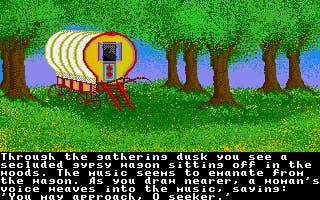
As confessionals stacked up, Garriott realized he was responsible for the unscrupulous actions of his players. In video games, those who threw morals out the window got ahead much faster than those who played by the rules—just like in real life. "There was something fundamentally wrong about their actions, but I couldn't really blame the players because they were doing exactly what the game has instructed them to do, or what the game seems to have encouraged them to do—even if not explicitly, then implicitly, through the game's mechanics, they were encouraged them to behave that way."
Equally disturbing was the fact that players who cleaved a bloody path through Ultima games made his games look tame. In effect, players were treating his games like games. Their goal was not to free a land under the thumb of tyranny and oppression. They were out to win and cultivate greater power.
Like a domino effect, this realization sparked another that set his imagination aflame. If players felt no compunction at misbehaving, he would have to scare them straight.
The first item on his to-fix list was the player—or, rather, the character they controlled. Characters in video games were just vessels used to encapsulate attributes and items. Garriott decided to flip the script. "It was important to me that you weren't playing a character. You couldn't be playing Conan the Barbarian. It had to be you. You, personally. Even though you, when you manifested in this world, might have gone from a skinny little computer nerd to a big, buff, heroic warrior, and maybe even changed genders, it was important that it feel like your soul, your spirit, inside your character so that you feel responsible for the deeds and actions your character performs."
Garriott dubbed Ultima IV's player-character the avatar, a Sanskrit word defined as a deity's human incarnation—the flesh-and-blood form they took when it became necessary to descend from the heavens and walk among their human subjects. Still, telling players that they, not some made-up character, inhabited the game world was only the first step. To make them to think twice before clubbing peasants who stood between them and a cool new sword, he had to convince them that they owned the body they inhabited.
Instead of letting players choose their class and race, and assign points to attributes, a gypsy greets them and asks them a series of ethical questions. There are no right or wrong answers. Choices boil down to how individual players feel about eight virtues: honesty, valor, compassion, justice, spirituality, humility, sacrifice, and honor. Their answers determine the type of character they play. If a player's answers favor honor, the gypsy pronounces them a paladin; spiritual players devote themselves to the arcane arts; players who lean toward compassion assume the role of a bard; and so on.
With the class decided, players assume their avatar form—a human. This represents another major departure from the template followed in previous games: eliminating stock fantasy races like dwarves and elves reinforces the notion that players are playing themselves.
Setting foot in the world of Britannia in their avatar forms, players notice a distinct lack of spaceships and aliens. Previous Ultima titles—as well as Akalabeth—contained a medley of themes and elements that reflected Garriott's diverse interests. For Ultima IV, he cleared away conflicting motifs and grounded his morality parable in fantasy tropes and characters: knights, wizards, paladins, castles, swords, and magic. "I wasn't trying to craft intellectual property," Richard says in regards to his early games. "I was just trying to bring everything I thought was cool to bear. It was only after Ultima III that I sat down and said, 'I really need to expunge from my work the obvious references to everybody else's work, and invent my own world from scratch."
To complete Ultima IV, players have to jump through a series of virtuous hopes. First, they must achieve enlightenment in the eight core virtues. Worshipping at shrines bolsters certain virtues, but the game also monitors players' actions, docking or adding points in a virtue based on how they behave in everyday situations, such as paying blind merchants the correct amount for their wares to increase their honesty, and standing resolute in battle to foster courage. Fleeing from fights brands them a coward, and shortchanging vendors clues NPCs in to their reputation as a cheat.
Virtues also affect the player's odds of attracting companions. Warriors won't fight alongside cowards; bards shun heroes incapable of showing compassion for the less fortunate. Rather than penalize immoral actions such as theft, Garriott opted to have his NPCs forgive, but never forget. As an example, players can steal herbs from a certain vendor. She will not label them a thief, nor will she sick guards on them. But hours later, players need a password to enter a certain area, and the herb vendor knows it—but she'll only give it to them if they've been kind to her.
"I wanted people to fall into that trap," Garriott says. "I would overly reward theft, and even find ways to rationalize it, or make it hard to not steal; you see gold, and that's the only place you see it—whatever it might be, I encouraged people to cross that moral line. Through that delayed feedback, not only did you make them reflect on, 'Man, not only have I done this, I've been doing it a lot, and now I don't even know how I can make amends to this woman I've been stealing from all this time', but people don't even know if you're testing them or not. They have to start looking at every single moment of their behavior to decide what is the right thing to do, because they don't know if the game will be watching."
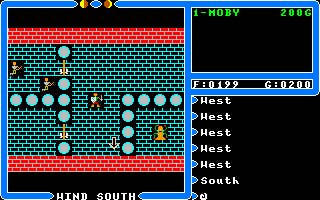
While chasing enlightenment, players must gather ancient artifacts from temples and dungeons. Once enlightened and in possession of the artifacts, players may descend into the Stygian Abyss, the toughest dungeon in the game. Their goal is to locate the Codex of Ultimate Wisdom, which enables them to ascend to Avatar-hood. Between players and the Codex lie challenges rooted in the virtues they worked so hard to foster.
Challenges in the Stygian Abyss take the form of scenarios designed to make players overthink what they need to do. Most of the time, the solution is simple: kill monsters and proceed to the next room. But after dozens, even hundreds of hours spent weighing each and every action, players would be on guard. Garriott knew that, and sought a way to test them without testing them. "For the final dungeon of Ultima IV, I wanted you to at least believe you were being tested on all your virtues in this final run. But often, there was little physical testing I could do. So I'd sit back and think, What is the player's current mindset? What is the player's current circumstance, and how can I reflect that to encourage the player to make up a story in their head?"
In one scenario, players enter a room to find doppelgangers of each member of their party—a cleric, a fighter, a paladin, and so on. Seeing another fully formed party should give them pause. What were they to do? How should they proceed? Attacking seemed out of the question; the NPCs were virtuous heroes, just like them. Except they weren't. They were monsters in the guise of heroes. Attacking them would incur no penalty. "This is all occurring to them in real-time, so it forces them to make quick decisions," Garriott explains. "And in this case, it really doesn't matter: they're all monsters. But the fact that players didn't know that means that they could create all sorts of unique stories in their heads."
Any doubts that players and critics would dismiss Ultima IV's trials as simplistic were dispelled when, two weeks before the game's release in September 1985, Robert stormed into Richard's office and read aloud from a letter written by one of Origin's quality assurance (QA) testers. The man was threatening to resign over one of the scenarios in the Stygian Abyss that mandated players to kill children in order to progress. "I was stunned," Richard Garriott recalls. "I said, 'I have no idea what this guy's talking about.' Robert said, 'I don't know, either, but whatever it is, we need to find it and get it out of the game. Whatever is creating this feeling, we'd better get out of the game.'"
Richard and Robert walked across the top floor of the garage and found the tester. The man sat stiffly at his desk, wrestling with whether or not to leave his job over what he viewed as a violation of good taste. Richard asked him to pull up the room responsible for his outrage. It flickered into existence on the screen, and he recognized it at once. Cages hung in all four corners of the room. Each cage was full of children. In the heart of the room, between the four cages, was a lever. Pulling it lowered the cages and released the children, who swarmed the player and attacked. The only way out was to kill the children and bolt for the exit... or so it seemed.
Relieved, Garriott explained the scenario. "Now, this was not a test, but I knew it would look like a test: no one in their right mind would think it's okay to kill children in a game about virtue, and yet I surrounded you with children that were attacking you."
The QA tester breathed a sigh of relief. It turned out the children were monsters in disguise. Although the tester was assuaged, Robert was not. Privately, he insisted that Richard remove the room, reasoning that Origin would suffer irreparable damage to its reputation if a parent group misinterpreted the trial. Lord British refused. Ultima IV was predicated on being virtuous, and the QA tester had recoiled at the notion of taking an action meant to be viewed as morally abhorrent—precisely the type of response Richard hoped to illicit. The QA tester's reaction proved that video games stimulated emotions common associated with film and literature.
Moreover, there were actually multiple ways to solve the room, as well as other such scenarios in Ultima IV. Players could cast a spell to lull the "children" to sleep, invoke other magic to scare them off, or simply avoid them and make a break for the egress. On top of engaging players emotionally, the game would engage players mentally.
Robert crossed his arms and restated his position. The room had to go. Once again, Richard rejected the notion. At an impasse, Robert played his ultimate trump card. He called their parents.
"Usually, when arguments broke out, my dad would agree with my brother and my mom would agree with me," Garriott says. "That's usually how things went down: we invoked parental involvement, but nothing got settled because they were split. This was the only time in company history where my mother sided with my brother."
Where Robert had badgered and insisted, Helen tried coaxing. It's only one room, she reasoned. Better to cut one room than suffer bad publicity. Richard raised the stakes: either the room stayed, or he'd scrap the game. Helen and Robert relented.
With fingers crossed and breath bated, Richard and his family waited for critics and consumers to pass judgment on Ultima IV: Quest of the Avatar when it released in September of 1985 The verdict arrived quickly: instant masterpiece. In 1987, Computer Gaming World praised the game for advancing the RPG genre past looting corpses and overthrowing a big bad. Ultima IV went on to become the first game in five years to dethrone Wizardry I: Proving Grounds of the Mad Overlord from its coveted spot at the top of the reader's poll for favorite game.
As for Helen's and Robert's concerns, they proved unfounded. "The room stayed, we published the game, and no one noticed the room. No one complained about it," Garriott says.
Thirty years removed from Ultima IV, Garriott believes the morality systems he engineered might represent his finest work. "If I am to think of things I'm proud of from my game-design past, Ultima IV is still a pinnacle design moment for me. Part of that was the concept of the avatar, but another part was how to answer the question: How do you make sure people don't disconnect, and instead play with sincere, emotional ties to their characters?"

